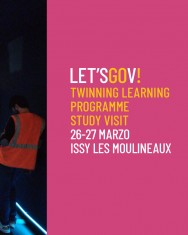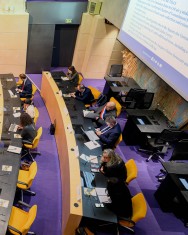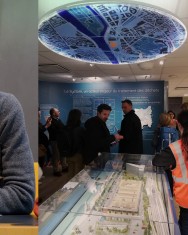- Home
- International relations and projects
- A Study Visit to Issy-les-Moulineaux for the Future of Sustainable Cities: Lessons from the French Smart City
A Study Visit to Issy-les-Moulineaux for the Future of Sustainable Cities: Lessons from the French Smart City
__
On March 26–27, 2025, the third study visit organized as part of the European project Let’sGOv, under the NetZeroCities Twinning Learning Program, took place in Issy-les-Moulineaux, in the Paris region. The initiative is part of a twinning journey involving the French city and Genoa, aimed at promoting the exchange of best practices among European administrations committed to the urban climate transition. Representatives from seven Italian partner and follower cities of the Let’sGOv project – Bologna, Florence, Milan, Parma, Prato, Rome, and Genoa – took part, along with the University of Bologna and a representative from the NetZeroCities consortium.
Over the two days, participants had the opportunity to delve into the strategies, tools, and practical experiments adopted by Issy-les-Moulineaux in pursuit of climate neutrality, transforming the city into a true laboratory for sustainable urban innovation.
Discussion and presentation sessions showcased how Issy-les-Moulineaux is positioning itself as a genuine smart city. The city has heavily invested in digital technologies: it is fully covered by fiber optics, has an extensive 5G network, a digitized administration, and online tools to engage citizens. Urban data, collected and made publicly available, are used to improve city services, ensure transparency, and develop innovative solutions such as autonomous shuttles, LED panels for road safety, and apps promoting sustainable mobility.
Energy is also a focal point of local policies: through the Issy Grid project, the city created France’s first smart energy network, combining solar power, storage systems, and efficient lighting. In the "Digital Fort" district, sustainable technologies such as pneumatic waste collection and geothermal energy are being tested. Additionally, with the HydroSeine project, Issy aims to become the country’s first hydrogen eco-district.
The city also presented two key climate tools: the climate budget and the Zero Carbon Challenge. The former, introduced in 2021, serves to plan and monitor actions to reduce CO₂ emissions, and in 2023 led to a 7.4% reduction, surpassing its targets. The Zero Carbon Challenge is a public initiative: over six months, families participated in workshops on topics such as energy savings, soft mobility, and waste reduction. So far, it has led to an average 33% reduction in waste and a 14.5% cut in carbon footprint.
Finally, the Métropole du Grand Paris presented the “Quartiers Métropolitains d’Innovation” program, which selects and tests innovative projects directly in neighborhoods, in collaboration with startups and citizens. The ideas are trialed on-site, introducing new eco-friendly urban furnishings or mobility solutions, with the aim of concretely and creatively meeting local needs.
During the study visit, participants had the chance to experience some of the local best practices firsthand: the Isseane incineration plant, the household waste sorting center, and the Flowell project – an experiment with smart, illuminated signage to enhance safety at urban intersections.
The study visit to Issy-les-Moulineaux proved to be a significant opportunity for exchange, learning, and relationship-building among cities engaged in the ecological transition. The meeting provided tangible and replicable examples of how to combine technological innovation, participatory governance, and climate strategies to build more resilient and sustainable cities.
Ultimo aggiornamento: venerdì 18 aprile 2025









